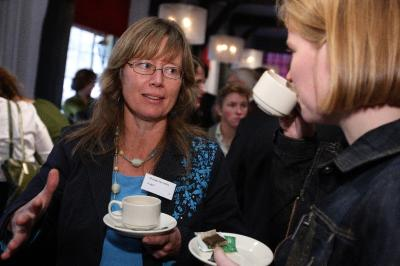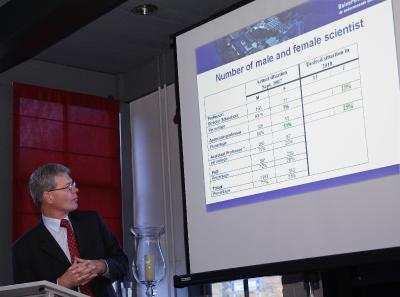On Thursday November 8th 2007 the third conference of the Female Faculty Network Twente took place at the University of Twente. The theme of the conference was Diversity. The main program of that day consisted of some lectures in the morning and two workshop in the afternoon. in the ‘UT nieuws’ of November 15th an article about the conference is placed (in Dutch).
In the ‘UT nieuws’ of November 15th also an article in English about the conference was placed.
‘Leer hoe het spel wordt gespeeld’
In de Broeierd was afgelopen donderdag de derde conferentie van het Female Faculty Network Twente. De ongeveer vijftig bezoekers kregen in de ochtend een aantal lezingen voorgeschoteld over gender issues. 's Middags konden de FFNT-leden meedoen aan workshops over hoe `het spel' gespeeld wordt. Irene van Geest - Jacobs - voormalig hoofd communicatie van het ministerie van Volksgezondheid, Welzijn en Sport - sprak over a woman's way to the top. De voertaal was Engels.
|
De bijeenkomst van het FFNT in de Broeierd |
Marie Curie, die in 1903 samen met haar man de Nobelprijs in de natuurkunde won, is hét grote voorbeeld voor Irene van Geest-Jacobs. `Zij laat zien dat je als vrouw én brains kunt hebben én een gezin kunt onderhouden. Ik las haar boek meerdere malen.'
Maar vaak is die weg naar de top voor vrouwen nog steeds een moeizaam proces. Van Geest-Jacobs weet er alles van. Geboren vlak na de Tweede Wereldoorlog groeide ze op in de tijd van het ex-warriorsyndrome. `Mannen eisten hun plek weer terug in de maatschappij. Stroopten hun mouwen op en waren klaar voor de wederopbouw. Voor vrouwen gold home sweet home: het huishouden wachtte.'
Die maatschappelijk ingebedde mentaliteit achtervolgde haar overal en altijd. `Voor ons vrouwen gold: education for leisure and pleasure. Een taal leerde je voor het reizen. Kunst deed je omdat het je charmeerde als gastdame aan tafel. Ik weet nog goed dat een decaan van de universiteit Groningen in mijn klas op de middelbare school langskwam. Hij raadde de meiden af geschiedenis te gaan studeren, omdat die hoogleraar niet zo op vrouwen gesteld was.'
Ideale vrouwenbanen waren er volgens de spreekster ook: verpleegster, secretaresse en lerares. `Journalistiek? Geen denken aan! Dat was veel te gevaarlijk en vaak 's avonds. Meestal ook nog in barretjes en cafeetjes. Niet geschikt voor vrouwen dus.'
De omslag kwam toen de anti-conceptiepil op de markt kwam, al ging de acceptatie ervan in de ogen van Van Geest-Jacobs véél te langzaam. `Traditionele zienswijzen liggen daaraan ten grondslag. De man wordt als leider gezien of zit in een soort vaderrol. Ik herinner me nog goed een vergadering waarin het mannelijke hoofd tegen me zei: Ireentje! Kom maar hier naast me zitten.' Dit tot haar afschuw, net als de uitspraak van haar rector op de middelbare school. `Die zei: Irene don't show your intelligence so much. Boys don't like it.'
Maar Van Geest-Jacobs zette stug door. Medio jaren negentig werkte ze als hoofd communicatie bij het ministerie van Volksgezondheid, Welzijn en Sport. Ze kwam veel in contact met vrouwen aan de top, zoals -destijds- minister Els Borst en staatssecretaris Erica Terpstra. Uit deze werkervaring selecteerde ze een paar handige tips. `Be smart by going blond', waarmee Van Geest-Jacobs bedoelt dat je je vrouwelijke charme gewoon moet inzetten. `Flirt your boss in the way you want'. Maar ook: `Take risks, live like a top sporter and dare to be ambitious!' Tot slot geeft ze mee dat humor zeer belangrijk is - humor will save you - en dat je het gewoon moet doen! `Take a step to the top.'
Na de lezingen volgden de FFNT-leden twee workshops over `girl power'. FFNT-bestuurslid Annemarie Braakman is positief over de conferentie. `Al had het misschien niet de hele dag moeten duren. Dat was achteraf gezien wel wat lang. Maar ik heb veel enthousiaste reacties gehoord. Ik vond het ook leuk dat er tijdens de ochtendsessie een paar mannen aanwezig waren. De workshops 's middags leverden schokkende reacties op. Sommige dames, vooral aio's, hadden geen idee van het spel dat gespeeld wordt.' De docent bij de faculteit Gedragswetenschappen bedoelt hiermee dat alléén inhoudelijke kennis op een gegeven moment niet voldoende is om je droombaan te krijgen. `Als je op school en op de universiteit je best doet, wordt dat beloond met een mooi cijfer. Als aio ga je voor zoveel mogelijk publicaties, maar daarna moet je méér doen. Je zult jezelf moeten verkopen, anders gaan andere mensen je voorbij.' Wat haar is bijgebleven? `Doe waar je goed in bent en gebruik de positieve dingen van jezelf.'
Sandra Pool
Reference: UT nieuws donderdag 15 november 2007, jaargang 42, nr. 34
`Diversity is no longer a choice, it’s the future’
Mixed gender teams succeed in the global world
On Thursday, November 8th the Female Faculty Network (FFNT) of the University of Twente held it's third annual Conference at de Broeierd hotel entitled `Diversity.' The gross disparity between the number of female faculty in comparison to the number of male faculty, especially in the top-level positions at the University of Twente was discussed. Opening speaker, Dr. Anne Flierman said, `If you look at the figures for Twente, we see that the increase that is happening on the national level has not yet taken place in Twente.'
|
Dr. Anne Flierman, Executive Board Director of the UT, shows figures for the University of Twente, during his opening remarks at last week's FFNT conference. |
Are the numbers getting any better for women? According to Flierman, chairman of the UT Executive Board, the promotion of female faculty and female staff members is a major issue on the board's agenda. Yet currently at the UT, there are 158 male full professors compared with only 11 females. That is a ratio of 93 percent to 7 percent in strong favor of males.
The numbers for the position of associate professor paint a somewhat rosier picture for woman with 126 males to 15 females holding this position, hence the figures indicate an 89 percent male ratio to 11 percent female ratio.
According to statistics from the Wiser Festival in October of this year, on average, only 15 percent of professors in the European Union (EU) are females. Sadly enough, the Netherlands, with only 9 percent female professors, ranks amongst the lowest of all EU countries.
The question begs asking, why are there so few women in the top positions? One reason could be attributed to the need for modern universities to value and develop policies that support diversity as well as promote the concept of mixed-gender teams that represent both the talents of men and women.
Speakers at the conference addressed the issue of the impact of diversity on organizations with full-force. Starting with Dr. Erwin Seydel, a professor in Applied Communication Studies, he said, `The careful shielding of a university from the activities of the world around us is the best way to chill interest and to defeat progress,' and he further added `We live in a remedial world. We study failure and weakness instead of strengths.'
The second speaker, a former Director of Communications for the Dutch Ministry of Health, Irene van Geest-Jacobs, spoke from a historical perspective about the role of women in society during the 19th century. In her opinion, `ambition has no gender, success does.' And why is this? What are the silent barriers for woman to reach success? She attributes these barriers in part to traditional perceptions in society of women that still exist today.
She was asked by a participant, `Do woman make a difference in a crisis situation?' Her answer was, `Groups manage a crisis-both good and bad people-it's nothing to do with gender.'
This praise for diversity was echoed in the words of the last speaker, Esther Mollema, as she asserted, `the UT is competing with the world,' and `together, men and women, make better decisions.' Owner and Executive Director for her own company, Direction, Mollema showed compelling statistics that confirm in High Performance Organizations (HPO), such as Dove (Unilever), diverse teams make better decisions and this leads to higher year-end profits. During the Q&A session, she challenged the leaders of the UT to adapt a policy of quotas to increase the number of women hired for top academic positions.
Looking to 2008, Flierman told the audience that he is certainly not satisfied with the progress that has been achieved so far, however he is optimistic about the ongoing dialogue and networking groups that are beginning to create an increased awareness in terms of this issue with the staff.
In the course of 2008, there will be many interesting professorship vacancies and a special conference will be held with the university Executive Board and the Management Team to discuss gender-related elements of improvement and talk more about how to promote women to top academic positions. It will be interesting to hear the results of these talks, considering among other things, the many professorship vacancies and the favorable financial situation of the UT that was cited for the coming year.
Robin Engels
Reference: UT nieuws donderdag 15 november 2007, jaargang 42, nr. 34


